Boyle J.A. The Cambridge History of Iran, Volume 5: The Saljuq and Mongol Periods
Подождите немного. Документ загружается.

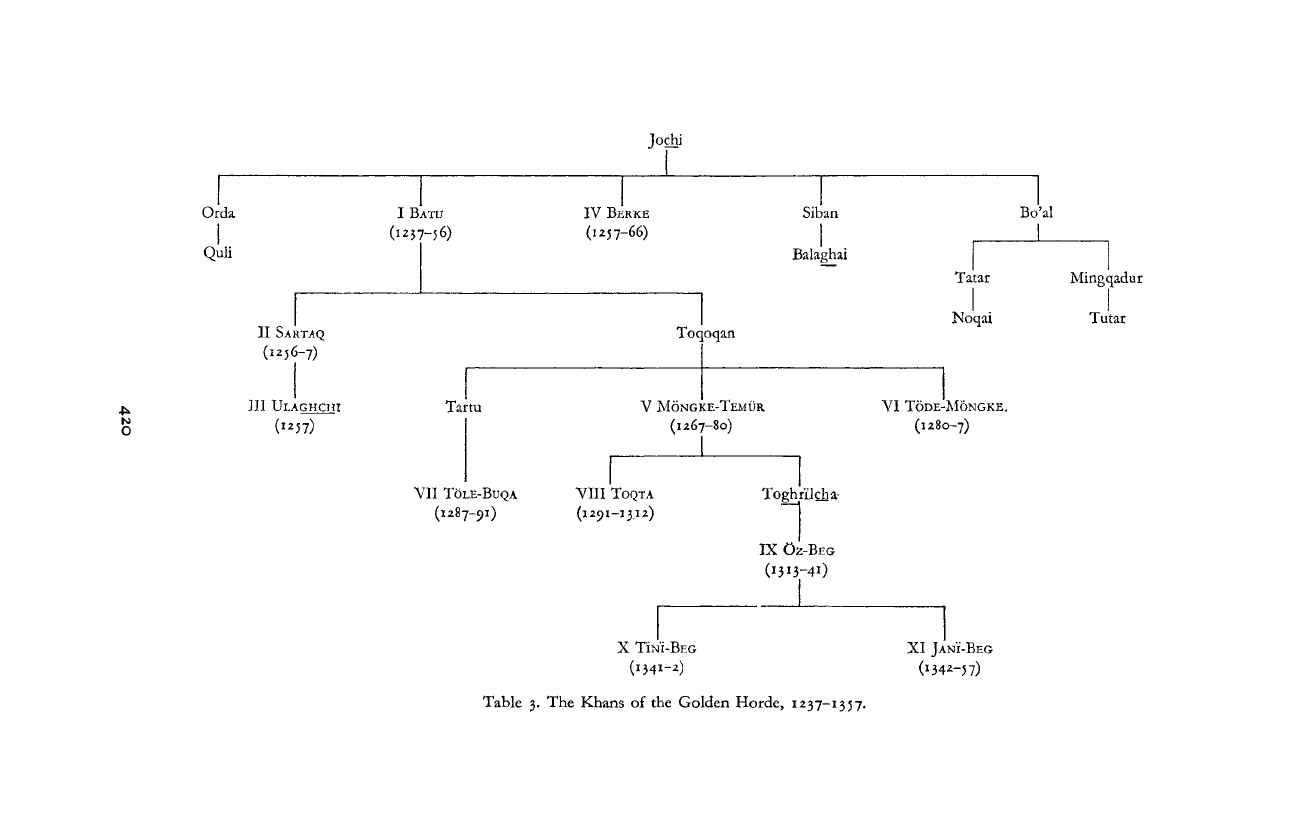
Jochi
Orda
Quii
li SARTAQ
(1256-7)
III ULAGHCHI
(«J7)
I BATU
(1237-56)
Tartu
VII
TÖLE-BUQA
(1287-91)
IV BERKE
(1257-66)
Siban
I
Balaghai
Bo'al
Toqoqan
V MÖNGKE-TEMÜR
(1267-80)
VIII TOQTA
(1291-1312)
Toghrijcha-
IX ÖZ-BEG
(1313-41)
Tatar
I
Noqai
VI TÖDE-MÖNGKE.
(1280-7)
Mingqadur
I
Tutar
X TINI-BEG
(1341-2)
XI JANI-BEG
(
x
342-5
7)
Table 3. The Khans of the Golden Horde,
1237-135
7.
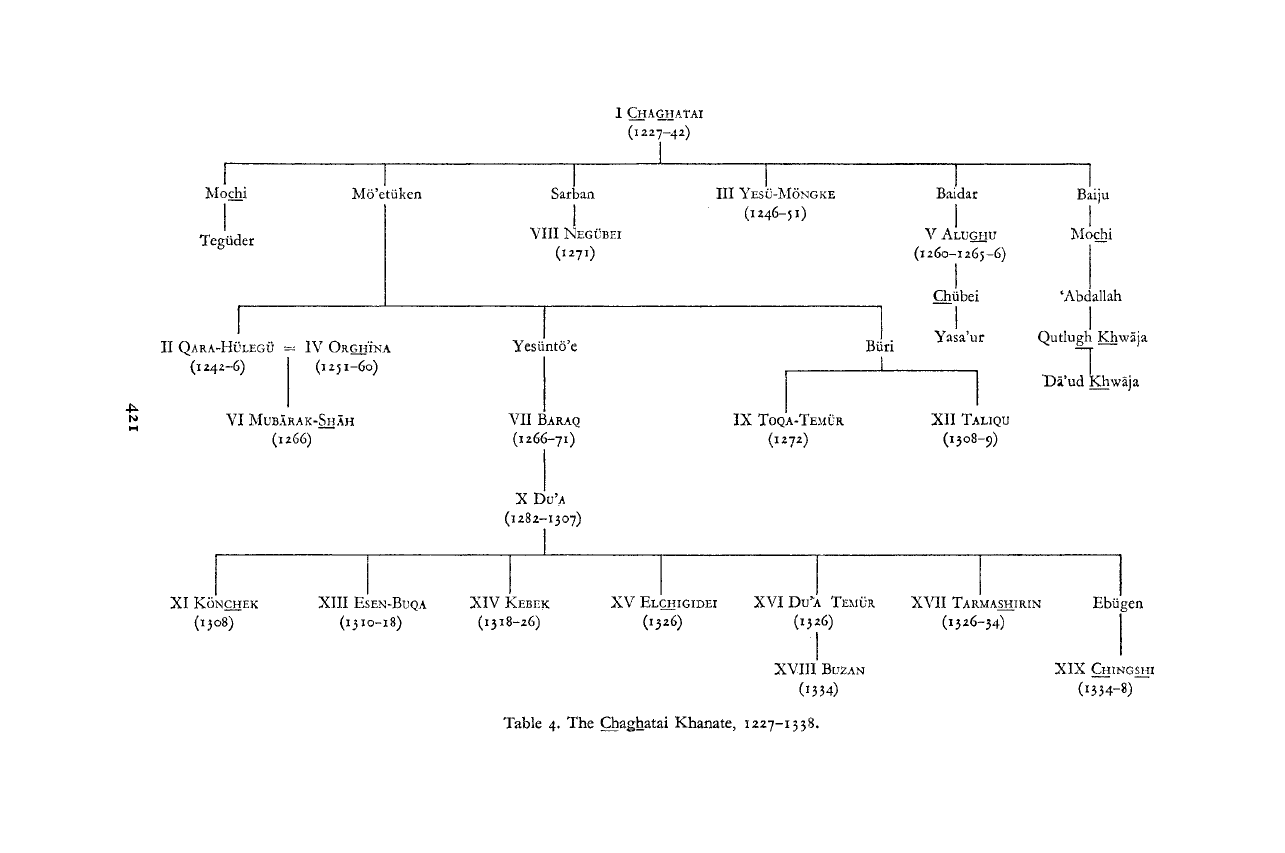
1 CHAGHAYAI
(1227-42)
Mochi
I
Teguder
Mò'etùken
II QARA-HULEGU — IV
ORGH'ÌNA
(1242-6) (1251-60)
VI
MUBARAK-SHÀH
(1266)
Sarban
Vili
NEGÙBEI
(1271)
Yesiintò'e
VII BARAQ
(1266-71)
III YESU-MÒNGKE
(1246-51)
IX TOQA-TEMUR
(1272)
Buri
Baidar
V
ALUGHU
(1260-1265-6)
I
.
Chiibei
Yasa'ur
XII TALIQU
(1308-9)
Baiju
!
Mochi
'Abdallah
Qutlug
h Khwàja
. 1
Dà'ud Khwàja
X DU'A
(1282-1307)
, I
XI KÒNCHEK
XIII
ESEN-BUQA
XIV KEBEK XV ELCHIGIDEI XVI
Du'A
TEMUR XVII
TARMASHIRIN
Ebiigen
(1308) (1310-18) (1318-26) (1326) (1326) (1326-34)
XVIII
Bu£AN
(1334)
Table 4. The Chaghatai Khanate,
1227-1338.
XIX
CHINGSHI
(1334-8)
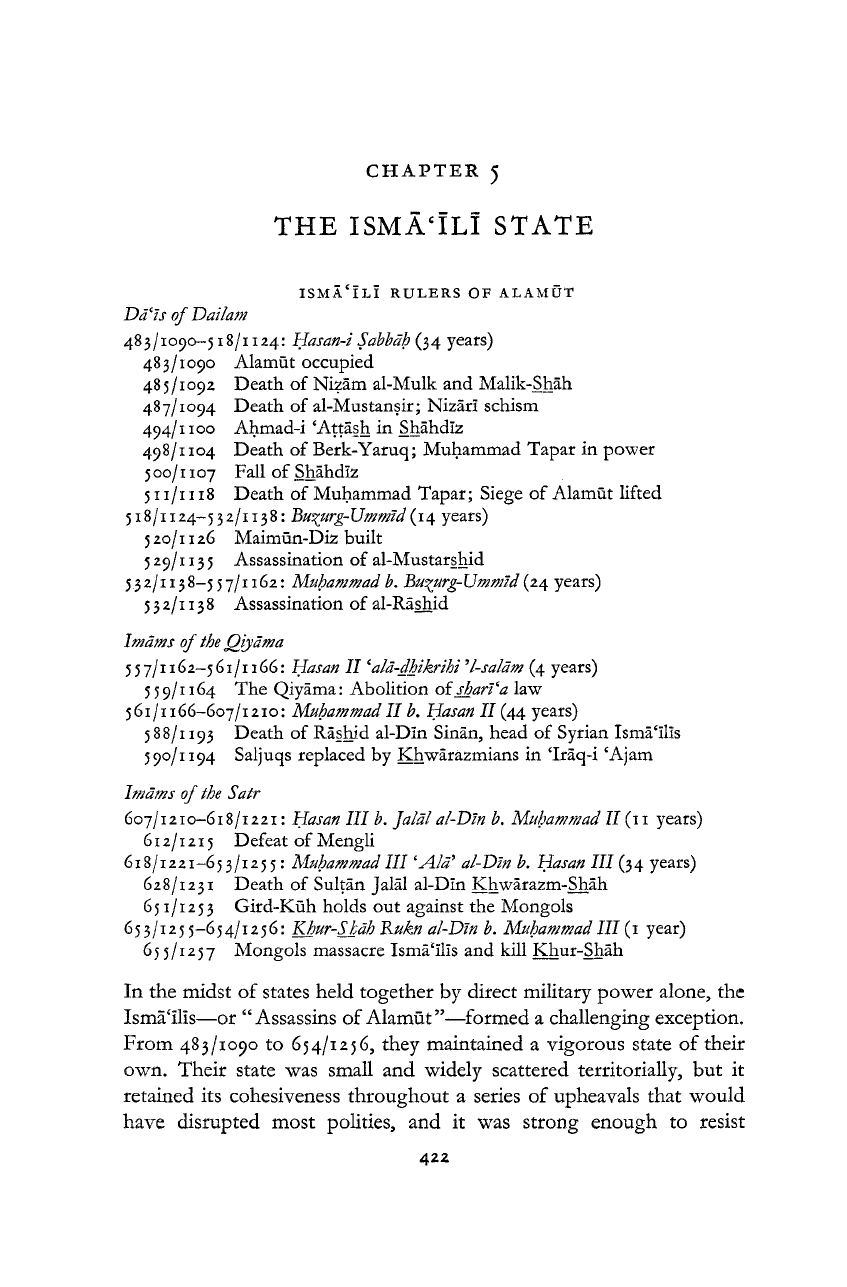
CHAPTER
5
THE
ISMÄ'ILI
STATE
ISMÄ'lLI RULERS OF ALAMÜT
Dä'Is
of
Dailam
483/1090-518/1124:
Hasan-i
Sabbäh
(34
years)
483/1090
Alamüt occupied
485/1092
Death of Nizam al-Mulk and Malik-Shäh
487/1094
Death of al-Mustansir; Nizäri schism
494/1100
Ahmad-i 'Attäsh in Shähdiz
498/1104
Death of
Berk-Yaruq;
Muhammad Tapar in power
5
00/1107
Fall of Shähdiz
511/1118
Death of Muhammad Tapar;
Siege
of Alamüt lifted
518/1124-532/1138:
Bu^urg-Ummld(14
years)
520/1126
Maimün-Diz built
529/1135
Assassination of al-Mustarshid
532/1138-557/1162:
Muhammadb.
Bu^urg-Ummld(24
years)
532/1138
Assassination of al-Räshid
Imams
of
the Qiyäma
557/116
2-561/1166:
lias an II
c
alä-dhikrihi
H-saläm
(4 years)
5
59/1164
The Qiyäma: Abolition of
shari^a
law
5
61/1166-607/1210:
Muhammad
II
b.
Hasan
II
(44
years)
5
88/1193
Death of
Ras
hid al-Dln Sinän, head of Syrian Ismä'ilis
590/1194
Saljuqs replaced by Khwärazmians in 'Iräq-i
'Ajam
Imams
of
the
Satr
607/1210-618/1221:
lias
an
III
b.
Jala!
al-Dln
b.
Muhammad
II
(11
years)
612/1215
Defeat of Mengli
618/1221-653/1255:
Muhammad
III 'Ala' al-Dln b.
Hasan
III
(34
years)
628/1231
Death of Sultan Jaläl al-Dln Khwärazm-Shäh
651/1253
Gird-Küh holds out against the Mongols
653/125 5-654/1256:
Khur-Shäh
Rukn
al-Dm b.
Muhammad
III
(1
year)
655/1257
Mongols massacre Ismä'Ilis and
kill
Khur-Shäh
In the midst of states held together by direct military power alone, the
Ismä'Ilis—or "Assassins of Alamüt"—formed a challenging exception.
From
483/1090
to
654/1256,
they maintained a vigorous
state
of their
own.
Their
state
was small and
widely
scattered territorially, but it
retained its cohesiveness throughout a series of upheavals
that
would
have disrupted most polities, and it was strong enough to resist
422
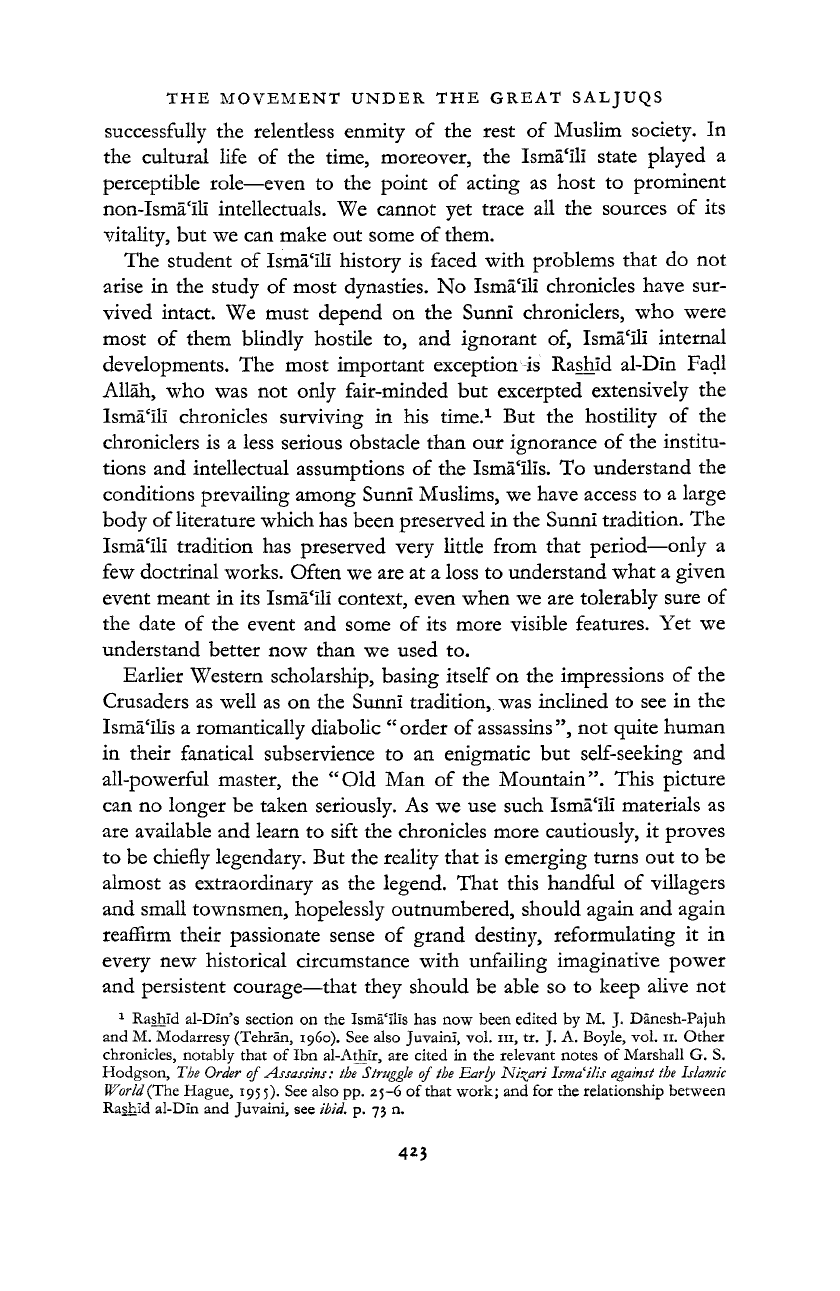
THE
MOVEMENT
UNDER
THE
GREAT
SALJUQS
423
successfully
the
relentless enmity
of the
rest
of
Muslim society.
In
the cultural
life
of the
time, moreover,
the
Isma'ili
state
played
a
perceptible role—even
to the
point
of
acting
as
host
to
prominent
non-Isma'ili intellectuals.
We
cannot
yet
trace
all the
sources
of its
vitality,
but
we
can
make
out
some
of
them.
The
student
of
Isma'ili history
is
faced with problems
that
do not
arise
in the
study
of
most dynasties.
No
Isma'ili chronicles have
sur-
vived
intact.
We
must depend
on the
Sunni chroniclers,
who
were
most
of
them blindly hostile
to, and
ignorant
of,
Isma'ili internal
developments.
The
most
important
exception
is
Rashid al-Din Fadl
Allah,
who was not
only fair-minded
but
excerpted extensively
the
Isma'ili chronicles surviving
in his
time.
1
But the
hostility
of the
chroniclers
is a
less serious obstacle
than
our
ignorance
of the
institu-
tions
and
intellectual assumptions
of the
Isma'ilis.
To
understand
the
conditions prevailing among Sunni Muslims,
we
have access
to a
large
body
of
literature
which has been preserved
in the
Sunni tradition.
The
Isma'ili tradition
has
preserved very little from
that
period—only
a
few
doctrinal works. Often we
are at a
loss
to
understand
what
a
given
event meant
in its
Isma'ili context, even when we
are
tolerably
sure
of
the
date
of the
event
and
some
of its
more visible features.
Yet we
understand
better
now
than
we
used
to.
Earlier Western scholarship, basing itself
on the
impressions
of the
Crusaders
as
well
as on the
Sunni tradition, was inclined
to see in the
Isma'ilis
a
romantically diabolic "order
of
assassins",
not
quite human
in their fanatical subservience
to an
enigmatic
but
self-seeking
and
all-powerful
master,
the "Old Man of the
Mountain". This picture
can
no
longer
be
taken seriously.
As we use
such Isma'ili materials
as
are available
and
learn
to
sift
the
chronicles more cautiously,
it
proves
to
be
chiefly
legendary. But
the
reality
that
is
emerging
turns
out to be
almost
as
extraordinary
as the
legend. That this handful
of
villagers
and small townsmen, hopelessly outnumbered, should again
and
again
reaffirm their passionate sense
of
grand destiny, reformulating
it in
every
new
historical circumstance with unfailing imaginative power
and persistent courage—that they should
be
able
so to
keep alive
not
1
Rashid al-DIn's section
on the
Isma'ilis
has now
been edited
by M. J.
Danesh-Pajuh
and
M.
Modarresy (Tehran,
1960). See
also Juvaini, vol. 111,
tr. J. A.
Boyle,
vol. 11. Other
chronicles,
notably
that
of Ibn
al-Athir,
are
cited
in the
relevant notes
of
Marshall
G. S.
Hodgson,
The Order
of
Assassins: the Struggle
of
the
Early Ni^ari Isma'ilis
against
the Islamic
World
(The Hague,
1955).
See
also
pp. 25-6 of
that
work;
and for the
relationship between
Rashid al-Din
and
Juvaini,
see ibid. p. 73 n.
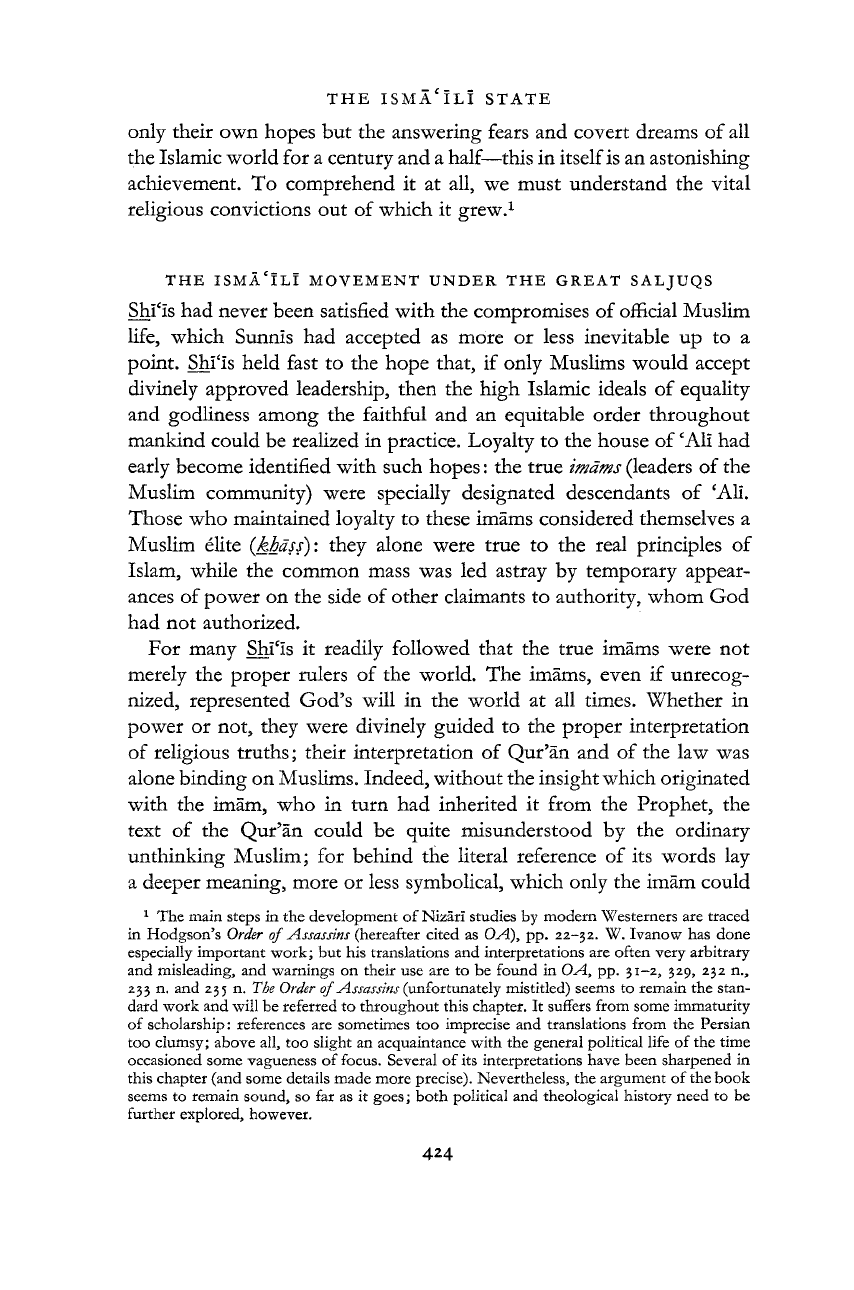
THE
ISMA'ÌLÌ
STATE
424
only
their own hopes
but the
answering fears
and
covert dreams of all
the Islamic world for a century and
a
half—this in
itself
is
an astonishing
achievement.
To
comprehend
it at
all,
we
must understand
the
vital
religious
convictions
out
of which
it
grew.
1
THE ISMÀ'ÌLÌ MOVEMENT UNDER
THE
GREAT SALJUQS
Shi'is
had never been satisfied with the compromises of
official
Muslim
life,
which Sunnis
had
accepted
as
more
or
less inevitable
up to a
point. Shfis held fast
to the
hope
that,
if
only Muslims would accept
divinely
approved leadership, then
the
high Islamic ideals
of
equality
and godliness among
the
faithful
and an
equitable order throughout
mankind could be realized
in
practice.
Loyalty
to the
house of
'Ali
had
early
become identified with such hopes
:
the
true imams
(leaders of the
Muslim
community) were specially designated descendants
of
'Ali.
Those
who maintained loyalty
to
these imams considered themselves
a
Muslim
élite
(Jkhàss)
:
they alone were
true
to the
real principles
of
Islam, while
the
common mass
was led
astray
by
temporary appear-
ances of power
on the
side of other claimants
to
authority, whom God
had
not
authorized.
For many Shi'is
it
readily
followed
that
the
true
imams were
not
merely
the
proper rulers
of the
world.
The
imams, even
if
unrecog-
nized,
represented God's
will
in the
world
at all
times. Whether
in
power
or
not, they were divinely guided
to the
proper interpretation
of
religious
truths
;
their interpretation
of
Qur'àn
and of
the law was
alone binding on
Muslims.
Indeed, without the insight
which
originated
with
the
imam,
who in
turn
had
inherited
it
from
the
Prophet,
the
text
of the
Qur'àn could
be
quite misunderstood
by the
ordinary
unthinking
Muslim
;
for
behind
the
literal reference
of its
words
lay
a deeper meaning, more
or
less
symbolical,
which only
the
imam could
1
The
main steps
in the
development
of
NizàrI studies
by
modern Westerners
are
traced
in Hodgson's
Order of Assassins
(hereafter cited
as OA), pp. 22-32. W.
Ivanow
has
done
especially
important
work;
but his
translations
and
interpretations
are
often very
arbitrary
and misleading,
and
warnings
on
their
use are to be
found
in OA, pp. 31-2, 329, 232 n.,
233 n. and 235 n. Toe Order of Assassins
(unfortunately mistitled) seems
to
remain
the
stan-
dard
work
and
will
be
referred
to
throughout this chapter.
It
suffers from some immaturity
of
scholarship
:
references
are
sometimes
too
imprecise
and
translations from
the
Persian
too clumsy; above all,
too
slight
an
acquaintance with
the
general political life
of the
time
occasioned some vagueness
of
focus. Several
of its
interpretations
have been sharpened
in
this chapter
(and
some details made more precise). Nevertheless,
the
argument
of the
book
seems
to
remain sound,
so far as it
goes; both political
and
theological history need
to be
further explored, however.
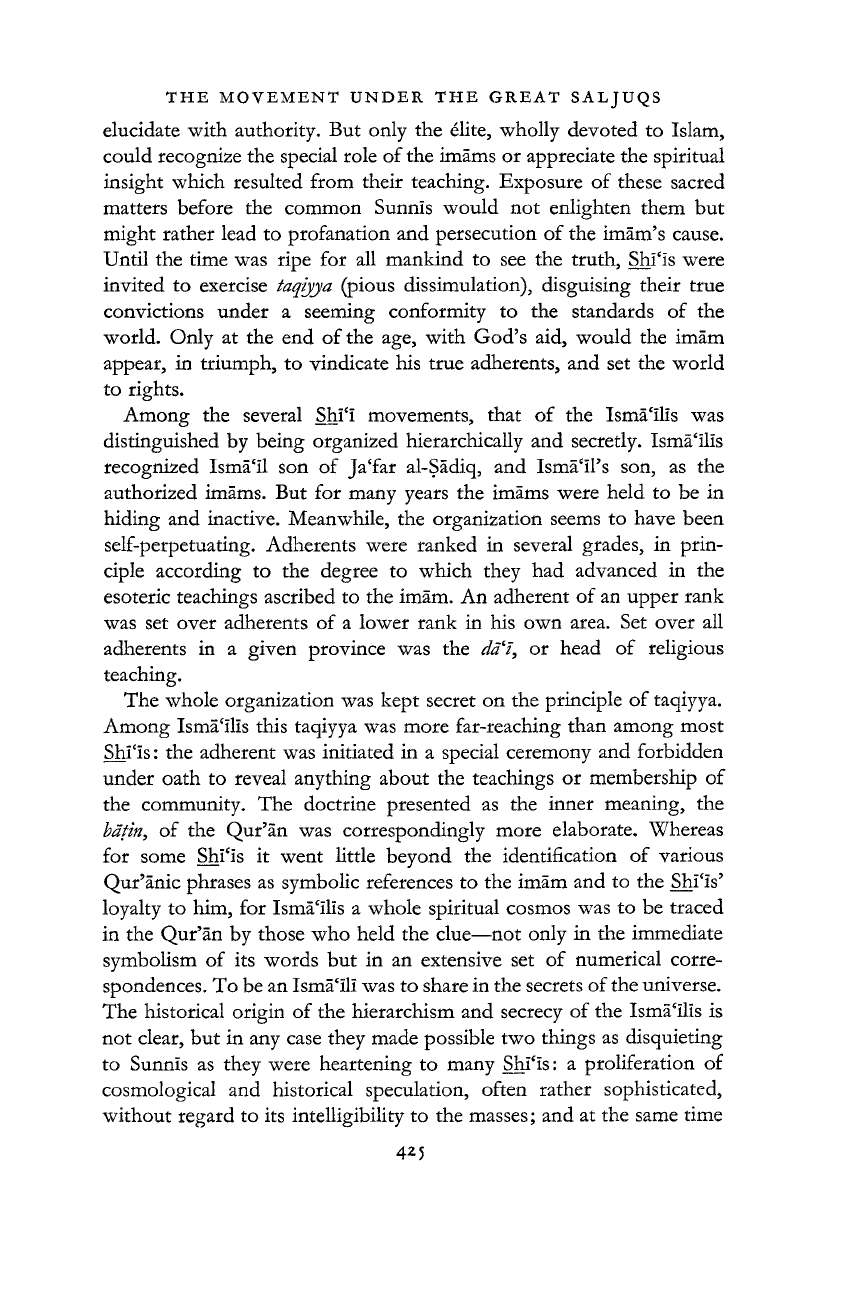
THE
MOVEMENT
UNDER THE
GREAT
SALJUQS
42 5
elucidate with authority. But only the elite,
wholly
devoted to Islam,
could
recognize the special role of the imams or appreciate the spiritual
insight which resulted from their teaching. Exposure of these sacred
matters
before the common Sunnis would not enlighten them but
might
rather
lead to profanation and persecution of the imam's cause.
Until the time was ripe for all mankind to see the
truth,
Shi'is were
invited to exercise
taqiyya
(pious dissimulation), disguising their
true
convictions
under
a seeming conformity to the
standards
of the
world.
Only at the end of the age, with God's aid, would the imam
appear, in triumph, to vindicate his
true
adherents, and set the world
to rights.
Among
the several Shi'I movements,
that
of the Isma'ilis was
distinguished by being organized hierarchically and secretly. Isma'ilis
recognized
Isma'il son of
Ja'far
al-Sadiq, and Isma'il's son, as the
authorized imams. But for many years the imams were held to be in
hiding and inactive. Meanwhile, the organization seems to have been
self-perpetuating. Adherents were ranked in several grades, in prin-
ciple
according to the degree to which they had advanced in the
esoteric teachings ascribed to the imam. An
adherent
of an upper
rank
was
set over
adherents
of a lower
rank
in his own area. Set over all
adherents
in a
given
province was the dd'i, or head of religious
teaching.
The
whole organization was kept secret on the principle of taqiyya.
Among
Isma'ilis this taqiyya was more far-reaching
than
among most
Shi'is:
the
adherent
was initiated in a special ceremony and forbidden
under
oath to reveal anything about the teachings or membership of
the community. The doctrine presented as the inner meaning, the
bdtin, of the Qur'an was correspondingly more elaborate. Whereas
for
some Shi'is it went little beyond the identification of various
Qur'anic phrases as symbolic references to the imam and to the
Shi'is'
loyalty
to him, for Isma'ilis a whole spiritual cosmos was to be traced
in the Qur'an by those who held the clue—not only in the immediate
symbolism
of its words but in an extensive set of numerical corre-
spondences. To be an Isma'ili was to
share
in the secrets of the universe.
The
historical origin of the hierarchism and secrecy of the Isma'ilis is
not clear, but in any case they made possible two things as disquieting
to Sunnis as they were heartening to many
Shi'is:
a proliferation of
cosmological
and historical speculation, often
rather
sophisticated,
without regard to its intelligibility to the masses; and at the same time
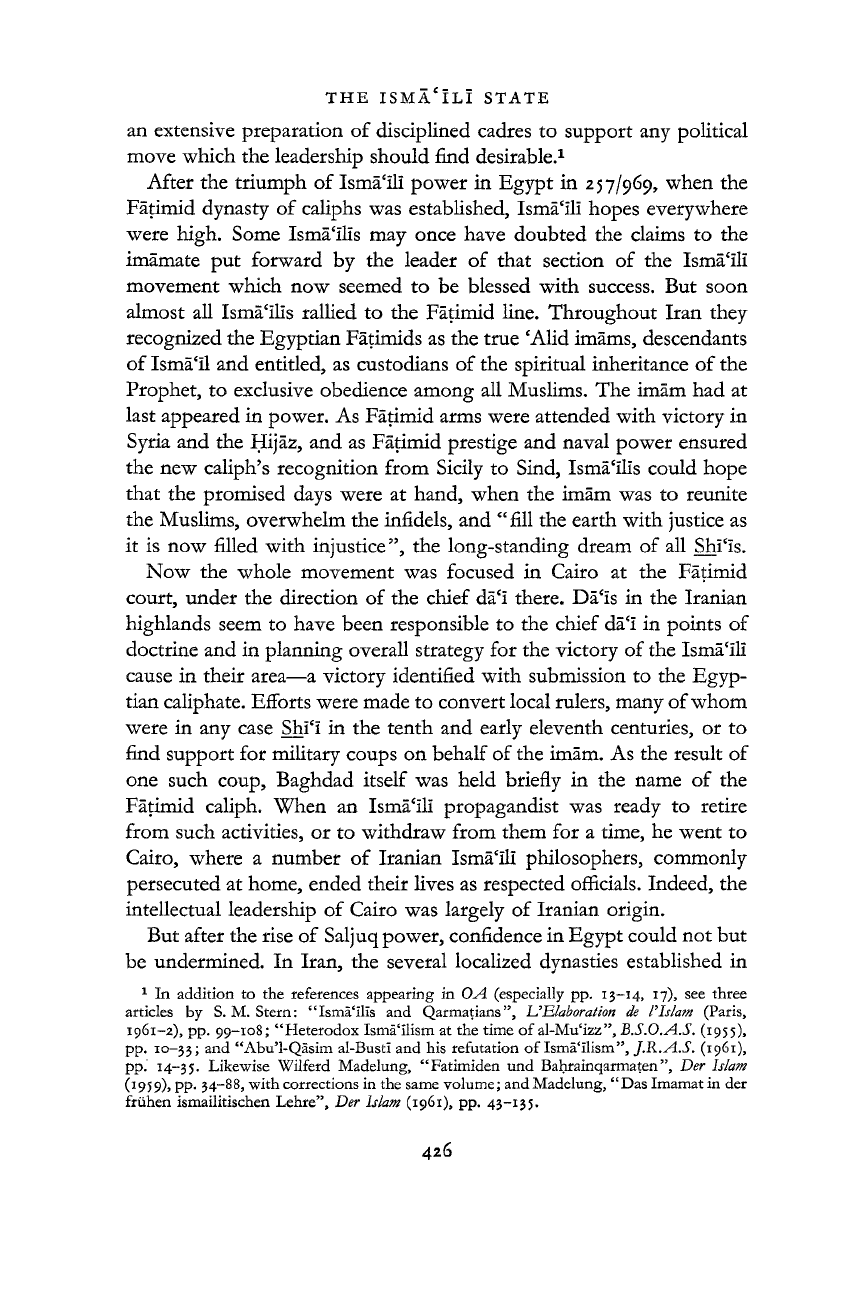
THE
ISMÄ'lLI
STATE
426
an extensive preparation
of
disciplined cadres
to
support
any
political
move
which
the
leadership should find desirable.
1
After
the
triumph
of
Ismä'ill power
in
Egypt
in
257/969, when
the
Fätimid dynasty
of
caliphs was established, Ismä'ili hopes everywhere
were high. Some Ismä'ills
may
once have doubted
the
claims
to the
imamate
put
forward
by the
leader
of
that
section
of the
Ismä'ili
movement which
now
seemed
to be
blessed with success.
But
soon
almost
all
Ismä'ills rallied
to the
Fätimid line. Throughout
Iran
they
recognized
the Egyptian Fätimids
as the
true
'Alid
imams, descendants
of
Ismä
c
il
and
entitled,
as
custodians
of
the spiritual inheritance
of
the
Prophet,
to
exclusive obedience among all Muslims. The imam
had at
last appeared
in
power. As Fätimid
arms
were attended with victory
in
Syria
and the
Hijäz,
and as
Fätimid prestige
and
naval power ensured
the new caliph's recognition from
Sicily
to
Sind, Ismä
c
ilis could hope
that
the
promised days were
at
hand,
when
the
imäm was
to
reunite
the Muslims, overwhelm
the
infidels,
and "
fill
the
earth
with justice
as
it
is now
filled with injustice",
the
long-standing dream
of
all Shi'is.
Now
the
whole movement
was
focused
in
Cairo
at the
Fätimid
court,
under
the
direction
of the
chief
dä
c
i there. Dä'Is
in the
Iranian
highlands seem
to
have been responsible
to the
chief
dä'I
in
points
of
doctrine
and in
planning overall strategy
for the
victory of the Ismä
c
ili
cause
in
their area—a victory identified with submission
to the
Egyp-
tian caliphate. Efforts were made
to
convert local rulers, many
of
whom
were
in any
case Shi'I
in the
tenth
and
early eleventh centuries,
or to
find support
for
military coups
on
behalf
of
the imäm. As
the
result
of
one such coup, Baghdad itself was held briefly
in the
name
of the
Fätimid caliph. When
an
Ismä'ili propagandist
was
ready
to
retire
from such activities,
or to
withdraw from them
for a
time,
he
went
to
Cairo,
where
a
number
of
Iranian
Ismä'ili philosophers, commonly
persecuted
at
home, ended their lives
as
respected
officials.
Indeed,
the
intellectual leadership
of
Cairo was largely
of
Iranian
origin.
But
after the rise
of
Saljuq power, confidence
in
Egypt could
not but
be undermined.
In
Iran,
the
several localized dynasties established
in
1
In
addition
to the
references appearing
in OA
(especially
pp.
13-14,
17), see
three
articles
by
S.M.Stern: "Ismä'ills
and
Qarmatians",
UElaboration de
F
Islam
(Paris,
1961-2),
pp. 99-108;
"Heterodox Ismä'Ilism
at the
time
of
al-Mu'izz",
B.S.O.A.S.
(1955),
pp.
10-33;
an
d
"Abu'1-Qäsim
al-Busti
and his
refutation
of
Ismä'Ilism",
J.R.AS.
(1961),
pp.
14-35.
Likewise
Wilferd Madelung, "Fatimiden
und
BahrainqarmatenDer
Islam
(1959),
pp.
34-88,
with corrections
in the
same volume;
and
Madelung, "Das Imamat
in der
frühen ismailitischen Lehre",
Der Islam
(1961),
pp.
43-135.
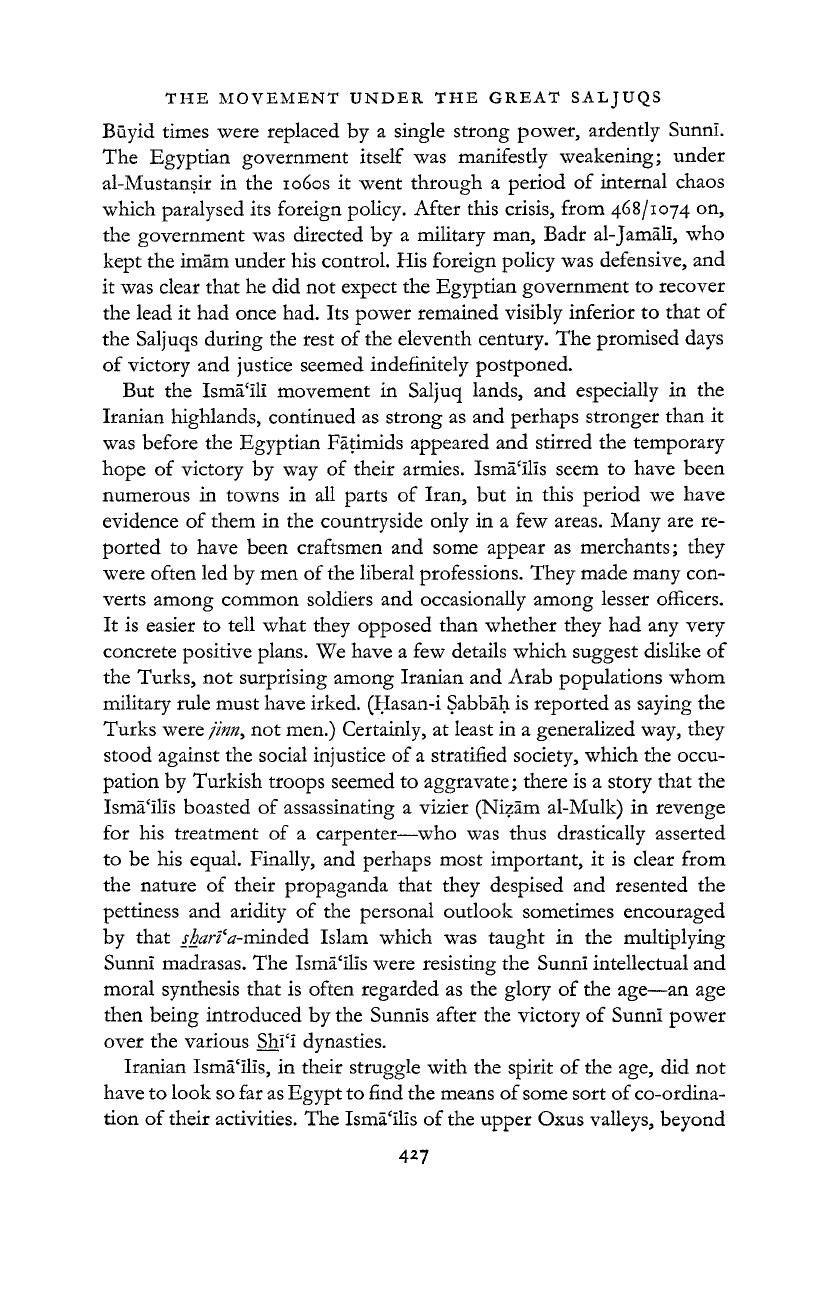
THE MOVEMENT UNDER THE
GREAT
SALJUQS
427
Buyid
times were replaced by a single strong power, ardently Sunni.
The
Egyptian government itself was manifestly weakening;
under
al-Mustansir in the 1060s it went through a period of internal chaos
which
paralysed its foreign policy. After this crisis, from 468/1074 on,
the government was directed by a military man, Badr al-Jamali, who
kept the imam
under
his control. His foreign policy was defensive, and
it was clear
that
he did not expect the Egyptian government to recover
the lead it had once had. Its power remained visibly inferior to
that
of
the Saljuqs during the rest of the eleventh century. The promised days
of
victory and justice seemed indefinitely postponed.
But
the Isma'Ili movement in Saljuq lands, and especially in the
Iranian
highlands, continued as strong as and perhaps stronger
than
it
was
before the Egyptian Fatimids appeared and stirred the temporary
hope of victory by way of their armies. Isma'Ilis seem to have been
numerous in towns in all
parts
of
Iran,
but in this period we have
evidence
of them in the countryside only in a few areas. Many are re-
ported to have been craftsmen and some appear as merchants; they
were
often led by men of the liberal professions. They made many con-
verts among common soldiers and occasionally among lesser officers.
It is easier to tell what they opposed
than
whether they had any very
concrete positive plans. We have a few details which suggest dislike of
the Turks, not surprising among
Iranian
and Arab populations whom
military rule must have irked. (Hasan-i Sabbah is reported as saying the
Turks
were
jinn>
not men.) Certainly, at least in a generalized way, they
stood against the social injustice of a stratified society, which the occu-
pation by Turkish troops seemed to aggravate;
there
is a story
that
the
Isma'ilis boasted of assassinating a vizier (Nizam al-Mulk) in revenge
for
his
treatment
of a carpenter—who was
thus
drastically asserted
to be his equal. Finally, and perhaps most important, it is clear from
the
nature
of their propaganda
that
they despised and resented the
pettiness and aridity of the personal outlook sometimes encouraged
by
that
sban'a-minded Islam which was taught in the multiplying
Sunni madrasas. The Isma'ilis were resisting the Sunni intellectual and
moral synthesis
that
is often regarded as the glory of the age—an age
then
being introduced by the Sunnis after the victory of Sunni power
over
the various Shi'i dynasties.
Iranian
Isma'ilis, in their struggle with the spirit of the age, did not
have to look so far as Egypt to find the means of some sort of co-ordina-
tion of their activities. The Isma'ilis of the upper Oxus
valleys,
beyond
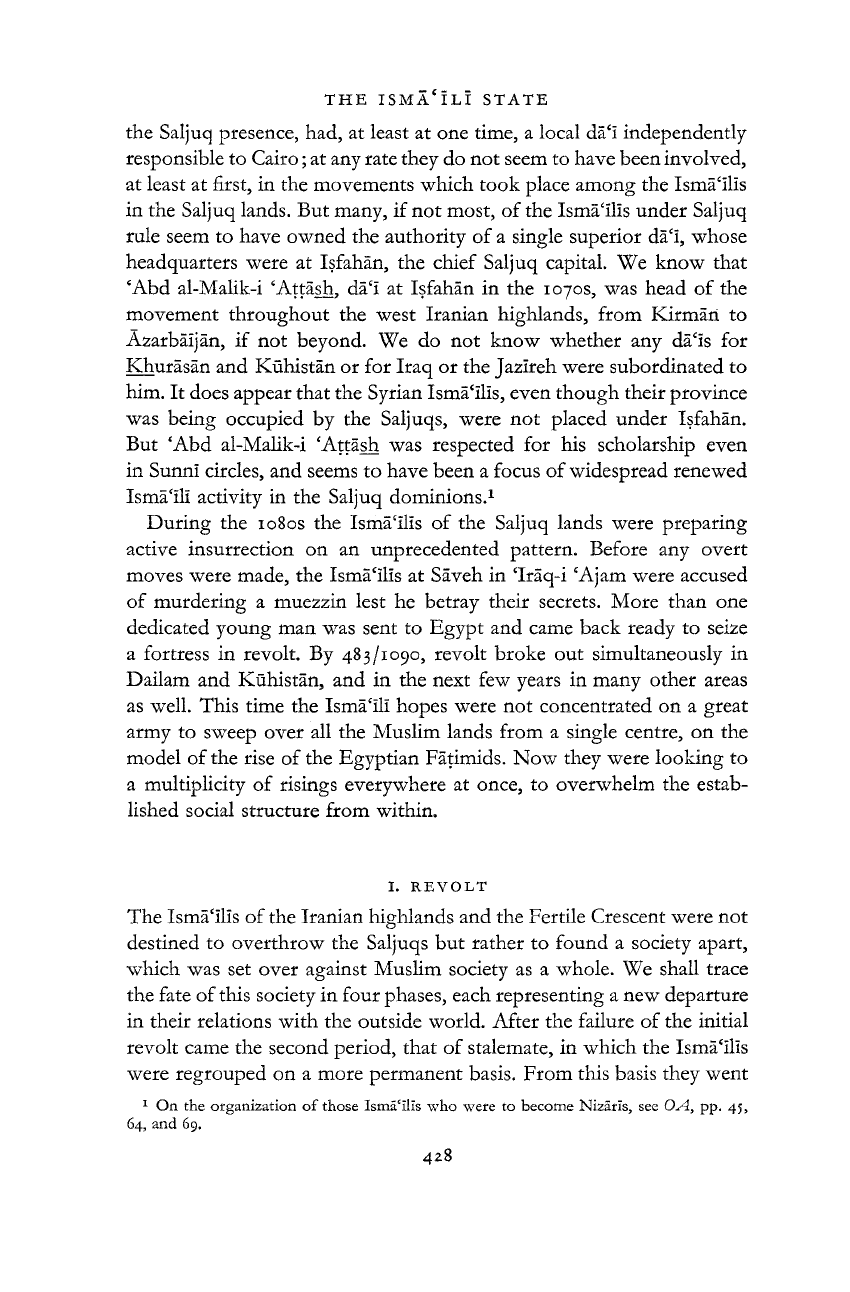
THE
ISMA'ILÌ
STATE
the Saljuq presence, had, at least at one time, a local da'I independently-
responsible to
Cairo;
at any
rate
they do not seem to have been
involved,
at least at first, in the movements which took place among the Isma'Ilis
in the Saljuq lands. But many, if not most, of the Isma'Ilis
under
Saljuq
rule seem to have owned the authority of a single superior da'I, whose
headquarters
were at Isfahan, the
chief
Saljuq capital. We know
that
'Abd
al-Malik-i 'Attash, da'I at Isfahan in the 1070s, was head of the
movement throughout the west
Iranian
highlands, from Kirmari to
Azarbaijan,
if not beyond. We do not know whether any da'Is for
Khurasan and Kuhistan or for
Iraq
or the Jazlreh were subordinated to
him. It does appear
that
the Syrian Isma'Ilis, even though their province
was
being occupied by the Saljuqs, were not placed
under
Isfahan.
But
'Abd al-Malik-i 'Attash was respected for his scholarship even
in Sunni circles, and seems to have been a focus of widespread renewed
Isma'Ili activity in the Saljuq dominions.
1
During the 1080s the Isma'Ilis of the Saljuq lands were preparing
active
insurrection on an unprecedented
pattern.
Before any overt
moves
were made, the Isma'Ilis at Saveh in 'Iraq-i
'Ajam
were accused
of
murdering a muezzin lest he betray their secrets. More
than
one
dedicated young man was sent to Egypt and came back ready to seize
a fortress in revolt. By 483/1090, revolt broke out simultaneously in
Dailam
and Kuhistan, and in the next few years in many other areas
as
well.
This time the Isma'Ili hopes were not concentrated on a great
army to sweep over all the Muslim lands from a single centre, on the
model of the rise of the Egyptian Fatimids. Now they were looking to
a multiplicity of risings everywhere at once, to overwhelm the estab-
lished social
structure
from within.
1. REVOLT
The
Isma'Ilis of the
Iranian
highlands and the Fertile Crescent were not
destined to overthrow the Saljuqs but
rather
to found a society
apart,
which
was set over against Muslim society as a whole. We shall trace
the fate of this society in four phases, each representing a new
departure
in their relations with the outside world. After the failure of the initial
revolt
came the second period,
that
of stalemate, in which the Isma'Ilis
were regrouped on a more
permanent
basis. From this basis they went
1
On the organization of those Isma'ills who were to become Nizarls, see OA, pp. 45,
64, and 69.
428
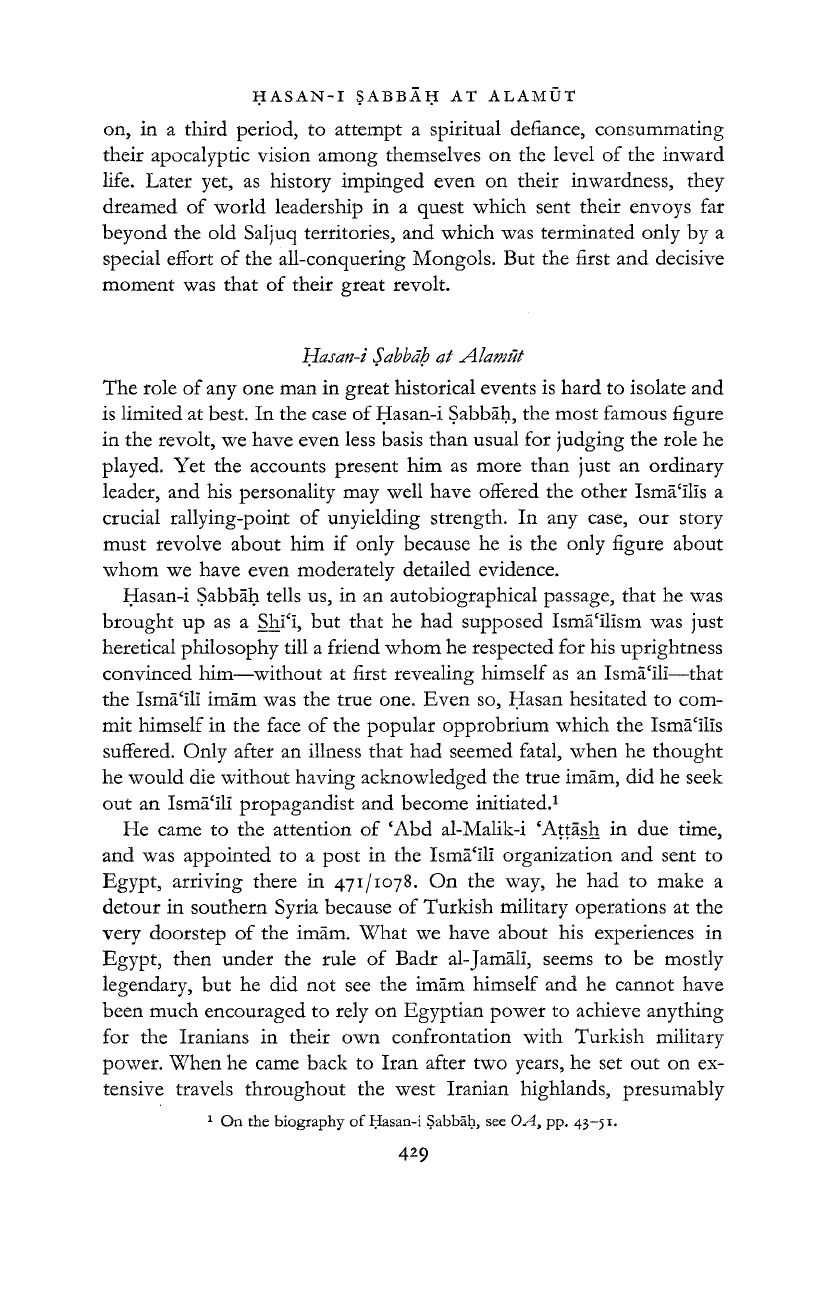
HASAN-I
SABBÁH
AT
ALAMÜT
on, in a third period, to attempt a spiritual defiance, consummating
their apocalyptic vision among themselves on the
level
of the inward
life.
Later yet, as history impinged even on their inwardness, they
dreamed of world leadership in a quest which sent their envoys far
beyond the old Saljuq territories, and which was terminated only by a
special
effort of the all-conquering Mongols. But the first and decisive
moment was
that
of their great revolt.
Hasan-i
Sabbáh
at
Alamñt
The
role of any one man in great historical events is hard to isolate and
is
limited at best. In the case of Hasan-i Sabbáh, the most famous figure
in the revolt, we have even less basis
than
usual for judging the role he
played.
Yet the accounts present him as more
than
just an ordinary
leader, and his personality may
well
have offered the other Ismá'ílis a
crucial
rallying-point of unyielding strength. In any case, our story
must revolve about him if only because he is the only figure about
whom
we have even moderately detailed evidence.
Hasan-i Sabbáh tells us, in an autobiographical passage,
that
he was
brought up as a
Shfi,
but
that
he had supposed Isma'ilism was just
heretical philosophy till a friend whom he respected for his uprightness
convinced
him—without at first revealing himself as an Isma'Ili—that
the Isma'Ili imam was the
true
one. Even so, Hasan hesitated to com-
mit himself in the face of the popular opprobrium which the
Ismá'ílis
suffered. Only after an illness
that
had seemed fatal, when he thought
he would die without having acknowledged the
true
imam, did he seek
out an Isma'Ili propagandist and become initiated.
1
He came to the attention of 'Abd al-Malik-i 'Attásh in due time,
and was appointed to a post in the Isma'Ili organization and sent to
Egypt,
arriving there in
471/1078.
On the way, he had to make a
detour in southern Syria because of Turkish military operations at the
very
doorstep of the imam. What we have about his experiences in
Egypt,
then under the rule of Badr al-Jamali, seems to be mostly
legendary, but he did not see the imam himself and he cannot have
been much encouraged to rely on Egyptian power to achieve anything
for
the Iranians in their own confrontation with Turkish military
power.
When he came back to
Iran
after two years, he set out on ex-
tensive travels throughout the west Iranian highlands, presumably
1
On the biography of Hasan-i Sabbáh, see OA, pp.
43-51.
429
